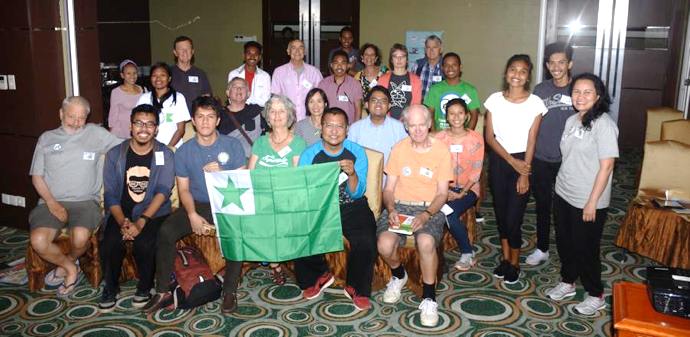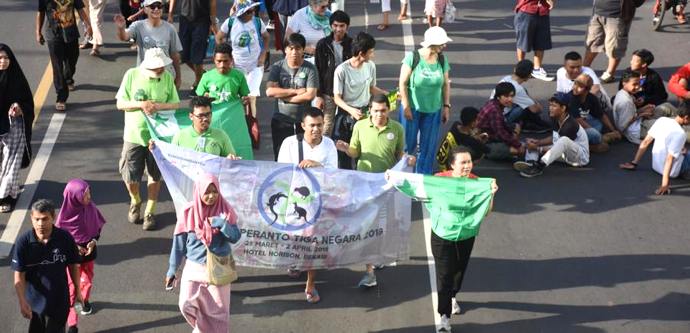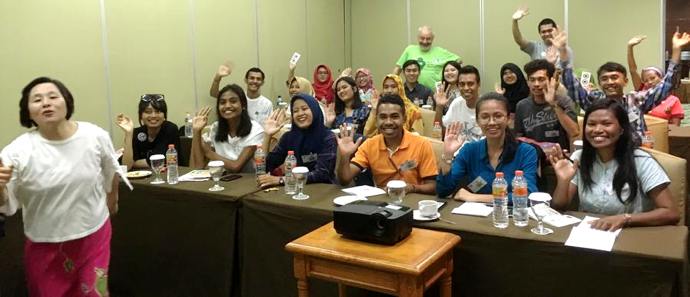Friendship in Bekasi
Second three-country congress, Bekasi, Indonesia
28 March – 2 April 2018

One of the numerous group photos in the Zamenhof room
I’m sitting in a blue Damri bus between Bekasi and the airport in Jakarta. The half-full bus only moves slowly, often even stands still. I wonder how many days (years) these traffic-stops steal from the population? Outside I see the huge, vast city of Jakarta. One hour ago we said good-bye to our new/old friends. So what was the second three-country congress like? Not as many people participated as two years ago in Bandung. Probably because the preparation didn’t go as smoothly this time (in Bekasi 63 from 8 countries).
Of course, not everything was perfect. For example, unfortunately we often didn’t eat together, simply because the food in the hotel was too expensive for the Indonesians and the East Timorese. The general inequality in the world is also reflected in this congress.
However, I would say that the congress was successful. The comments of the participants were mainly positive.

Vehicle-free morning. Incredible. The main street without cars. A good opportunity to promote Esperanto
- Heidi Goes presented her almost-ready book on the history of Esperanto in Indonesia. A very impressive thing. She really explored many details about various Indonesian Esperantists, places and events. This book will be a great model for the history of Esperanto in other countries. Also for us.
- We went on an excursion: We saw interesting things in the National Gallery, the National Museum and “Taman Mini Indonesia Indah”, a place that shows many diverse traditional buildings from various parts of Indonesia.
- We were lucky. Heidi also managed to get money from UEA to allow ten(!) young East Timorese to attend. They definitely made the event more lively and enriching. I hope we can continue our contact with them. Think about visiting them in East Timor.
- The Skype presentations worked well: Humphrey Tonkin and Mark Fettes presented the current situation of UEA and Esperanto in the world. Both were fairly positive about the future of our language. Jonathan also presented via Skype “Writing for the electronic environment”. It’s very good to have someone so attentive among us.
- Albert, a young man from the Philippines, represented his country very well and I enjoyed hearing about the young Esperantists in the Philippines for the first time.
- We listened to presentations about unusual trees, flags, the use of Esperanto in the University of Valencia in Spain, the Cassini project and others.
- A group of us participated in the weekly vehicle-less morning. Between 6am and 10am cars are banned from the main street of Bekasi and during these four hours the street abounds with pedestrians, cyclists, joggers. We promoted Esperanto and I enjoyed the fact that we were finally outside in the real world, not just in rooms on the second floor of the Horison Hotel.
- As in Bandung, energy, interest and enthusiasm among the young people was a great encouragement for the slightly older foreigners.
- During the closing ceremony many stressed that the most valuable aspect of the congress was friendship. I hope many of the new friends will remain friends.

The beginners’ class with teacher Elstara
Will there be a third three-country congress? Who knows? We have begun to explore the possibility of establishing a joint event in Bali in two or three years’ time. What do you think?
Sandor Horvath
President, AEA
